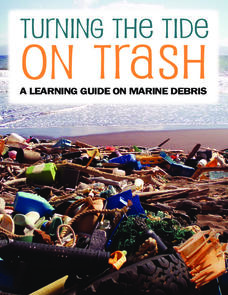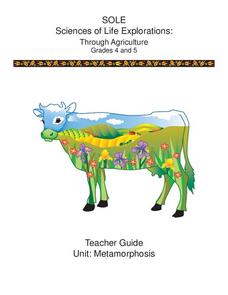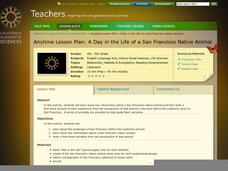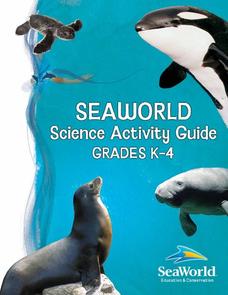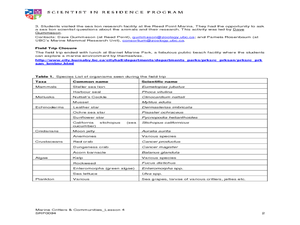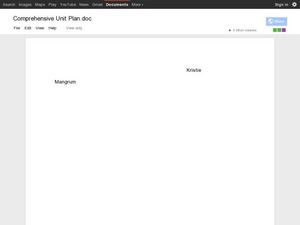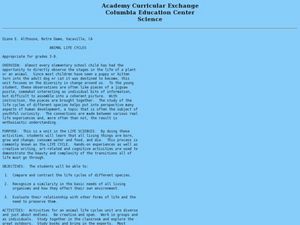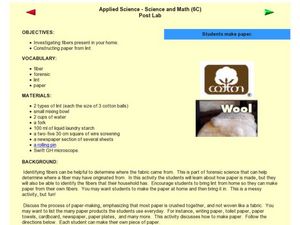NOAA
Turning the Tide on Trash: A Learning Guide on Marine Debris
The lessons in this learning guide are designed to increase youngsters' awareness of the impacts of marine debris and to teach them about pollution prevention techniques. This fabulous, 30-page packet is chock full of important...
Berkshire Museum
The Three Life-Giving Sisters: Plant Cultivation and Mohican Innovation
Children gain first-hand experience with Native American agriculture while investigating the life cycle of plants with this engaging experiment. Focusing on what the natives called the Three Sisters - corn, beans, and squash - young...
Baylor College
Lungometer
Life science learners construct lung-o-meters from gallon-sized milk jugs and then measure their lung capacities. For older students, have them graph the vital lung capacities of each person in the class. Cross-curricular pieces are...
Cornell University
Metamorphosis
Looking for an insect unit that addresses multiple skill strategies? Young entomologists explore multiple life cycles of insects that go through metamorphosis. The brainteasers and mobile activity spark learner interest before guiding...
Curated OER
Marine Debris
Now is the time to educate tomorrow's citizens to care for the planet, and here is a lesson to help facilitate the process. Collect some marine debris and bring it into class. Have your class separate it into types and then test each...
Curated OER
Effects of Oil Spills on Environment and Marine Life
Students explore oceanography by conducting an environmental experiment in class. In this oil spill lesson, students discuss the human need for oil and what is at stake when we drill for oil in our oceans. Students read a book in class...
California Academy of Science
A Day inthe Life of a San Francisco Native Animal
Although the lesson is specifically about the San Francisco Bay area, it's good enough to be adapted to any local region. Children research what the landscape in San Francisco was like prior to settlement, they consider the types of...
Curated OER
Designing a Germination Experiment
Students explore botany by participating in a seed experiment. In this plant nutrition lesson, students define several science experiment vocabulary terms like observation, treatment, and replicate. Students utilize soaked seeds in a...
Space Awareness
The Intertropical Convergence Zone
Young scientists know it is hotter along the equator, but why is it also rainier? Through the process of completing two experiments and a worksheet, scholars discover the answer is the intertropical convergence zone. First, they...
Curated OER
Endangered Marine Turtles
Students work in groups and experience what it is like to be a hatchling marine turtle by playing a board game. In this endangered marine turtles lesson, students research the threats to marine turtle hatchlings. Students then create a...
Science Matters
Blubber Gloves: It’s All About Insulation
Instill the concept of adaptation with the help of Blubber Gloves—ziplock bags, shortening, and duct tape. Scholars discuss how animals and plants keep warm in polar regions, record their predictions, and try on their Blubber Gloves to...
National Park Service
Glaciers and Water
Explore the amazing power of glaciers with a hands-on earth science experiment! After first learning basic background information, learners go on to create their very own chunks of frozen water and gravel in order to observe first-hand...
Curated OER
Marine Debris
Students perform experiments to examine if debris float, or blow in the wind. The effects of these characteristics on the marine debris are then discussed. They determine how a material can influence what becomes marine debris.
Curated OER
Wagons Ho! Hard Times! Hard Choices!
You have just hit the lesson plan jackpot! This isn't just a lesson, it's a ten-day unit covering westward expansion, pioneer life, and the Oregon Trail. Activities include baking, model building, role-play, newspaper writing, science...
Curated OER
The Art and Science of Impressionist Color
Discover Impressionist painting as students investigate the 19th century combinations of colors characteristically used. Students experiment with their own paintings, utilizing primary and secondary colors.
Sea World
Seaworld Science Activity
A fun collection of activities about marine life would be a great addition to your elementary science unit. From cute penguins to scary sharks, the unit features crafts, experiments, and basic research projects that will teach your...
Baylor College
Energy for Life (Energy from Food)
Energy comes in many forms, but how do living things get the energy they need to survive and thrive? In a simple, controlled experiment with yeast, water, and sugar, groups make observations about how yeast reacts with water alone, then...
Curated OER
The Marvels of Mud
Young scientists roll up their sleeves and get a little dirty in this three-day earth science investigation. Following the scientific method, children monitor the growth of algae in pond water samples in order to determine the role that...
Curated OER
Marine Critters and Communities
Students touch, see, smell, and hear marine animals that live in a marina. In this marine animals lesson plan, students take field trip to a marine environment after studying the animals.
Curated OER
WET Science Lesson #3: Comparison of Aquatic and Terrestrial Plants
Elementary life science explorers compare and contrast aquatic and terrestrial plants (elodea and soybeans) in a Venn diagram. Some background information is provided to support direct instruction, and general instructions are provided...
Curated OER
The Life Cycle of the Mealworm
Fourth graders provide a habitat for live mealworms and observe their life cycle. In this animal life cycle and scientific inquiry lesson plan, 4th graders create a habitat for a live mealworm and observe and record related data as it...
Curated OER
Animal Life Cycle
Students conduct hands-on experiments. In this life cycle instructional activity, students are able to observe a variety of animals as they travel through their life cycle (brine shrimp, mealworms, frog eggs and chicken eggs). Students...
Curated OER
Animal Life Cycles
Learners participate in numerous activities to gather information about parts of the life cycle. In this life science lesson, the teacher choose from a number of activities to create or support an interdisciplinary unit about the life...
Curated OER
Applied Science - Science and Math (Post Lab)
Learners explore science. In this create science lesson, students come up with their own science experiment. They use their basic knowledge of hypothesis and procedure to come up with an experiment. This lesson includes background...


